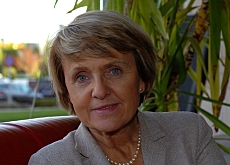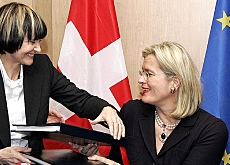Brussels hopes for Swiss solidarity

The European Commissioner for Regional Policy tells swissinfo Brussels wants Switzerland to speed up its financial aid to the ten new EU member states.
Danuta Hübner says European Union citizens hope Swiss voters will approve their country’s SFr1-billion ($800-million) Swiss contribution to the so-called Cohesion Fund in the ballot expected to take place.
Switzerland’s contribution is aimed at helping alleviate social and economic disparities among EU member states . Swiss assistance to the ten new states will be accorded directly through bilateral deals.
Hübner, formerly Poland’s Minister for European Affairs, argues that the European Commission should have the possibility to ensure that the Swiss payments are in line with the Commission’s development priorities.
swissinfo: How do you respond to concerns that the regional subsidies to new EU member countries will encourage an increasing number of companies in western Europe to move east?
Danuta Hübner: The very opposite could happen. As a rule European funds help create jobs and spur economic growth.
It’s all about investment and not charity, this goes for Swiss companies too. Investment is not only beneficial for the new location of a company; it also translates into income and new demand.
Let’s not forget that the EU’s regional policy also contains certain protective measures.
swissinfo: Switzerland has pledged to contribute SFr1 billion for the development of the new member states over the next five years. Is this enough?
D.H.: Well Norway has offered to pay nearly twice as much, namely about €230 million (SFr360 million) per year.
But Switzerland’s contribution is appreciated. It’s not just the money that counts but the gesture and solidarity.
swissinfo: What do you think about the threat of a referendum?
D.H.: There is always a risk with such votes, of course.
The result of last year’s referendum on the extension of a labour accord with the EU to the new member states was widely welcomed by Brussels.
I remember the heated debates in Poland and how pleased we were that the question was resolved.
I hope Swiss voters are aware that EU citizens hope very much to get another sign of support from Switzerland.
swissinfo: Is there going to be more bargaining next year when Bulgaria and Romania are due to become EU members?
D.H.: There has not been a formal decision yet on whether the two countries will join the EU. But it is likely that there will soon be two more states which can benefit from the Cohesion Fund.
It’s not possible to foresee the reaction of Norway, Liechtenstein, Switzerland and Iceland.
From an economic point of view there will be an additional 30 million people participating in a single market, this also means major business opportunities, for Switzerland too.
Europe – which stands for peace and stability – will then extend to a much more volatile region. But I believe the benefits will justify the launch of new negotiations.
swissinfo: Last December the governments of the 25 EU member states decided to cut payments to the Commission over the next seven years. How will this affect EU regional policy?
D.H.: Other policy areas might be hit harder by the decision than the Commission for Regional Policy. Having said that, we have also suffered heavy cuts. It’s mostly the old member states which stand to lose about 30 per cent of the subsidies compared with what they receive today.
What will suffer is interregional cooperation, also beyond EU borders, because of cuts to a fund destined for promoting that.
There will be less available for the well-off regions. They will have to provide considerable funding themselves for projects on research and development, innovation and competitiveness. Investment in infrastructure will also decrease.
swissinfo-interview: Tomas Miglierina in Brussels
Switzerland has agreed to pay SFr1 billion to the ten new EU member states, mainly in eastern Europe, to boost their growth and help close the social and economic gap with the richer, old member states.
In March the Swiss parliament approved the legal basis for the payments, but several rightwing parties intend to challenge the decision to a nationwide vote.
The Swiss government is still to provide details of the funding amid concerns that the money could be taken from the regular development aid budget.
Ten new EU countries will receive payments from Switzerland’s SFr1 billion contribution to the Cohesion Fund:
Poland: SFr489 million
Hungary: SFr131 million
Czech Republic: SFr110 million
Lithuania: SFr71 million
Slovakia: SFr67 million
Latvia: SFr60 million
Estonia: SFr40 million
Slovenia: SFr22 million
Cyprus: SFr6 million
Malta: SFr3 million
SFr2 million set aside for urgent projects

In compliance with the JTI standards
More: SWI swissinfo.ch certified by the Journalism Trust Initiative


You can find an overview of ongoing debates with our journalists here. Please join us!
If you want to start a conversation about a topic raised in this article or want to report factual errors, email us at english@swissinfo.ch.